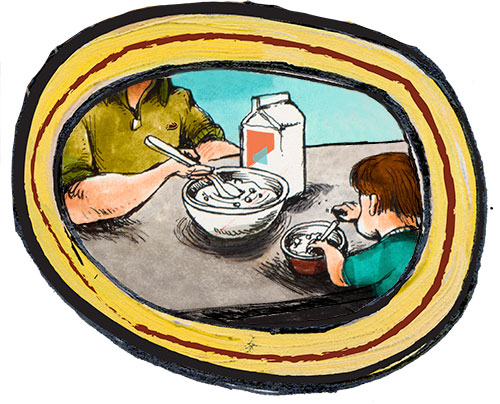
Not a Cliché: The Most Important Meal of the Day
Overwhelmingly, science has proven that breakfast really is the most important meal of the day, affecting performance from the classroom to the boardroom, with numerous benefits beyond education and success, including improved nutrient intakes and better overall health. In fact, eating breakfast regularly has been linked with greater intakes of fiber, calcium, iron, vitamin C, and other vitamins and minerals, and lower intakes of fat, cholesterol and sodium.
Kids who eat breakfast have
Higher test scores 1-7
Improved daily attendance 3,4,7
Better weight-related outcomes 8-14
They also are better nourished, have fewer school health clinic visits, better attention and memory, and are better able to concentrate on learning.
What happens when you skip breakfast?
We all need fuel throughout the day to function – and when you haven’t eaten since the night before, you could experience headaches, exhaustion and trouble focusing. It could even affect your metabolism and blood sugar, causing you to reach for unhealthy snacks throughout the day.
Breakfast? But I don’t have …
...time.
Mornings are hectic. Finding your son’s shoes, getting the baby food stain out of your shirt, making sure your daughter has her homework and you have your presentation notes – who has time to make pancakes?
Luckily, breakfast doesn’t have to be a whole production. Make-ahead options like overnight oats or drinkable yogurt give you the nutrient boost you need without forcing you to get up earlier.
...appetite.
Many people just aren’t hungry when they first get up in the morning. Eating too early may even make them nauseated. If that’s you, it’s OK to eat breakfast a little later.
Breakfast in the Classroom programs offer kids the opportunity to eat a later breakfast during the first period of the day. On-the-go breakfasts like smoothies are great for working adults to take to work and sip throughout the morning.
...money.
Prepared food can get pricey, especially when you’re buying it to feed the whole family, every day.
Fortunately, dairy offers excellent inexpensive options. Even a cup of yogurt or a glass of milk are going to make a huge difference in your morning. For your kids, take advantage of free or reduced school breakfast.
The most important part of the most important meal
A nutritious breakfast that includes low-fat milk makes up a quarter of a child’s daily nutrient needs. It’s also linked to a higher intake of calcium – a nutrient many Americans are lacking. All the more reason to make sure milk is on the menu every morning.
The Science
1. Wyon D, et al. An Experimental Study of the Effects of Energy Intake at Breakfast on the Test Performance of 10 Year-Old Children in School. Int J Food Sci Nutr. 1997;48(1):5-12.
2. Vaisman N, et al. Effects of Breakfast Timing on the Cognitive Functions of Elementary School Students. Arch Ped Adol Med. 1996 150:1089-1092.
3. Murphy JM, et al. The Relationship of School Breakfast to Psychosocial and Academic Functioning: Cross-sectional and longitudinal observations in an inner-city sample. Arch Ped Adolt Med. 1998;152:899-907.
4. Powell CA, et al. Nutrition and education: a randomized trial of the effects of breakfast in rural primary school children. Am J Clin Nutr. 1998;68:873-9.
5. Pollitt E, et al. Fasting and Cognition in Well- and Undernourished Schoolchildren: A Review of Three Experimental Studies. Am J Clin Nutr. 1998; 67(4):779S-784S.
6. Jacoby E, et al E. Benefits of a school breakfast program among Andean children in Huaraz, Peru. Food and Nutr Bulletin. 1996; 17:54-64.
7. Murphy JM. Breakfast and Learning: An Updated Review. J Curr Nutr Food Sci. 2007; 3(1): 3-36.
8. Alexander KE, et al. Association of breakfast skipping with visceral fat and insulin indices in overweight Latino youth. Obesity. 2009;17(8), 1528-1533.
9. Barton BA, et al. The relationship of breakfast and cereal consumption to nutrient intake and body mass index: the National Heart, Lung, and Blood Institute Growth and Health Study. J Am Dietetic Assoc. 2005;105(9), 1383-1389.
10. Deshmukh-Taskar PR, et al. The relationship of breakfast skipping and type of breakfast consumption with nutrient intake and weight status in children and adolescents: the National Health and Nutrition Examination Survey 1999-2006. J Am Dietetic Assoc. 2010;110(6), 869-878.
11. Fiore H, et al. Potentially protective factors associated with healthful body mass index in adolescents with obese and nonobese parents: a secondary data analysis of the third national health and nutrition examination survey, 1988-1994. J Am Dietetic Assoc.2006;106(1), 55-64.
12. Merten MJ, et al. Breakfast consumption in adolescence and young adulthood: parental presence, community context, and obesity. J Am Dietetic Assoc. 2009;109(8), 1384-1391.
13. Niemeier HM, et al. Fast food consumption and breakfast skipping: predictors of weight gain from adolescence to adulthood in a nationally representative sample. J Adolescent Health. 2006;39(6), 842-849.
14. Timlin MT, et al. Breakfast eating and weight change in a 5-year prospective analysis of adolescents: Project EAT (Eating Among Teens). Pediatrics. 2008;121(3):e638-645.


